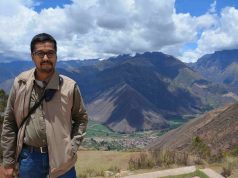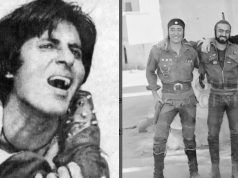
 By Manoj Pande
By Manoj Pande
&  Naresh Kumar
Naresh Kumar
In the pantheon of public schools established in the hills during the British rule, stands Oak Grove – the only residential railway school – at Jharipani established by the East Indian Railway Company (EIR). The EIR, was incorporated at London in May 1845 with Sir R Macdonald Stephenson as its Managing Director, came to India in July 1845 to survey the line from Calcutta to Delhi, completing the work by April 1846.
The first train from Howrah to Hooghly ran on August 15, 1854. The Railway line reached Kanpur (Cawnpore) in 1858 and, by 1862, it had come up to the banks of the river Yamuna outside Delhi. The bridge over the Yamuna came up later.
As EIR spread in North India, its employees also grew in number, many of them being European or Anglo-Indians. To educate their wards on the lines of schools in England it was decided by the Directors of the Company to set up a residential school in a hill climate.

This is not the complete team photo , but has Standing from Right:
Dhyan Chand ( Second), & Leslie Hammond (third)
The estate, ‘Oak Grove’, which was available for sale was purchased by EIR and the school started on June 1, 1888 with 28 students. The school grew over the years and by 1905 had over 500 students, who were imparted not only classroom knowledge, but also involved them in physical activities and games. As a result, many students went on to earn name and fame in the field of sports. Of these, four represented India in the Olympic Games prior to Independence.
Olympics and Oak Grove: India won Gold in three successive Olympics in Hockey prior to Independence – Amsterdam (1928), Los Angeles (1932) and Berlin (1936). And each time ‘Oakgrovians’ were in the team, playing with the legendary Dhyan Chand.
Amsterdam (1928): Richard James Allen, Broome Eric Pinniger, Leslie Charles Hammond.
Los Angeles (1932): Richard James Allen, Broome Eric Pinniger, Leslie Charles Hammond,
Richard John Carr.
Berlin (1936): Richard James Allen.
Richard James Allen was the goalkeeper in all the three Olympics. Broome Eric Pinniger as centre-half was the Vice-Captain in 1928 & 1932. Leslie Charles Hammond was the defender and Richard John Carr was a forward who played alongside Dhyan Chand.
Richard James Allen: Born in Nagpur (Central Provinces) on June 4, 1902, he studied in the Oak Grove School and later at St Joseph’s College Nainital. He passed away in Bangalore in 1969.
He was the goalkeeper of the Indian team and has a record of conceding only two goals in ten matches in three Olympics combined. An interesting anecdote about him pertains to the 1932 Olympics when India defeated USA 24-1. The American team scored their only goal when Richard was off the field signing autographs!
Broome Eric Pinniger: Born in Saharanpur (United Provinces) on December 28, 1902, he passed away at the age of 94 on December 30, 1996 at Edinburgh in the UK.
In his time, he was regarded as the world’s best Centre Half. Initially the Vice-Captain of the Indian Hockey team in the 1928 Amsterdam Olympics, he became the captain when the regular captain Jaipal Singh had left the team. In the subsequent 1932 Los Angeles Olympics, he was one of the four repeat players from the 1928 team. He received his education at the Oakgrove School. Later, he was an employee with the North Western Railway and was posted in Lahore. An excellent marksman, he could have represented India in shooting in which he had won several awards. However, India did not send any team to the 1920 Antwerp Olympics. His wife Florence was one of the best javelin throwers of her time.
Leslie Charles Hammond: Born on March 4, 1905 in Madras, he was one of the seven siblings to a Dartford born Englishman and his second wife. He studied at the Oakgrove School before moving on to Lucknow for further education.
Hammond played the left back position. As a fairly tall player, he not only had advantage of height and reach, but was also able to cover ground quickly with his long legs. He was selected for the 1928 Olympic team following the 1928 Inter Provincial tournament, where he had played for the winning team- the United Provinces. He played 3 matches in Amsterdam without allowing a goal. Like Eric Pinniger, he too was one of the four repeat players from the 1928 squad and one of the several players from the 1932 team to emigrate to Australia. He passed away on June 26, 1955 at the very young age of 50, in Ballarat, Victoria, Australia. His widow left his gold medals to the Sovereign Hill Museum in Ballarat.
Richard John Carr: Born on January 21, 1911 in Jhajha in Bihar. He studied at the Oak Grove School and was the school captain in 1928. An all-round sportsman, he excelled in Athletics and swimming besides hockey.
He played as a striker in the forward position along with the legendary Dhyan Chand scoring one goal against USA in the 1932 Los Angeles Olympics. He also competed in the men’s 4 x 100 metres relay in those games.
He worked as a driver in the East Indian Railway and later emigrated to Australia and lived in Melbourne, where he also took up coaching and contributed to improving the country’s hockey skills. He passed away on April 25, 2000.
He was selected in the team for the 1932 Olympics also but could not participate as his employers did not grant him leave!
Searching the internet, one found extract of a news item in The Guardian, London of Tuesday July 7, 1936, which reads as following:
“ Indian Hockey Tour: Sixteen out of the seventeen players originally chosen for the Indian Olympic hockey team, now on their way to Europe, were able to obtain leave for the tour. The only exception appears to be RJ Carr, a dashing inside right who took part in the Indian victory at Los Angeles in 1932; owing to his recent appointment to the staff of a railway company doubts arose as to whether he would accept nomination for the tour, and it seems that Ahmed Sher, of Bhopal, has been given his place in the team. Dhyan Chand has been appointed as captain… In one respect, the Indian team may prove to be slightly weaker than its predecessors, for E Pinniger, still regarded as the greatest hockey centre half of the day in India, declined nomination because of his career as a railwayman, though he participated in the trials.”
In addition to the above four, the school has produced many sportspersons. Many of those who migrated after independence, especially to New Zealand and Australia, continued their association with Hockey. Their descendants visit the school and recall the memories of their grandparents. Sports fields in the school remain in good fettle and children get ample time to play and hone up their skills. Incidentally, one of these fields was supposed to be the platform for the aborted attempts to build a railway line from Dehradun to Mussoorie.
(Manoj Pande is a former Member Staff of the Railway Board. He was also the President of the Railway Sports Promotion Board. Naresh Kumar is the current Principal of the Oak Grove School. An IRPS officer, he is a sports and adventure enthusiast.)








